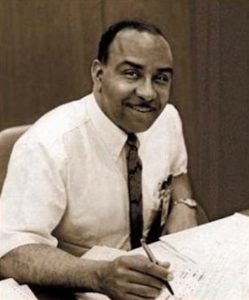
Harry Davis Sr.
Harry Davis was born on this date in 1923. He was a Black civil rights activist, politician, and businessman.
From the Northside of Minneapolis, Minnesota, he was the youngest of six children to Leland C. and Elizabeth Frances Davis. William Harry Davis grew up in a neighborhood mixed with Blacks and Jews. His grandfather, a member of the 54th infantry during the American Civil War, was also a horse doctor at Fort Snelling after the war. Stricken with polio at the age of two, Davis’ mother had been trained as a child in medicine by her parents and grandparents by way of Virginia and Louisiana. Her family’s methods were passed down from their African roots, which included a centuries-old African medical background. Her treatment of her young son helped him become an excellent athlete.
Davis graduated from Minneapolis North H.S. in 1941 and married his lifelong wife and partner Charlotte in October 1942; the couple had three children. That same year, he began working at the ONAN Corporation, eventually becoming one of the first Black executives at a major Twin Cities corporation. While working and supporting a new family, Davis began coaching boxing full-time in 1943. He became the region's most successful amateur boxing coach and served on the U.S. Olympic boxing committee. These athletic accomplishments happened at the Phyllis Wheatley Community Center, a Black settlement house with many program activities. In 1945, he began a lifelong relationship with the NAACP, further fueling his civic leadership abilities.
1957, Davis led a historic church merger between Border Methodist and Hennepin Avenue Methodist congregations. 1966, Davis worked with the Twin Cities Opportunity Industrialization Center or TCOIC. During this time, he became a part of the Hennepin County Mobilization of Economic Resources Board (MOER), part of America’s War on Poverty program. Davis also became the founding chief executive of the Minneapolis Urban Coalition during this time. From there, he served the Minneapolis Civil Service Commission. In 1969, Davis became a member of the Minneapolis school board and campaigned as the city's first Black mayoral candidate.
Davis was a staunch supporter of civil rights for four decades and remains active. In his autobiography (Overcoming, 2002), Harry Davis Sr. describes an unending struggle to overcome racism in all aspects of life in Minneapolis. For over 60 years, he has received numerous awards and citations for his leadership in business, education, politics, religion, and sports. Davis's story serves as a reminder that the American Civil Rights movement was not confined to the Deep South or large urban cities. He transformed lives for the better in Minneapolis and its surrounding counties. W. A. Harry Davis Sr. died of cancer on August 11, 2006.
Voices That Guide Us (Interview)
African American Registry
Overcoming
The autobiography of W. Harry Davis
Edited by Lori Studevant
Copyright 2002, Afton Historical Press
ISBN 1-890434-52-3